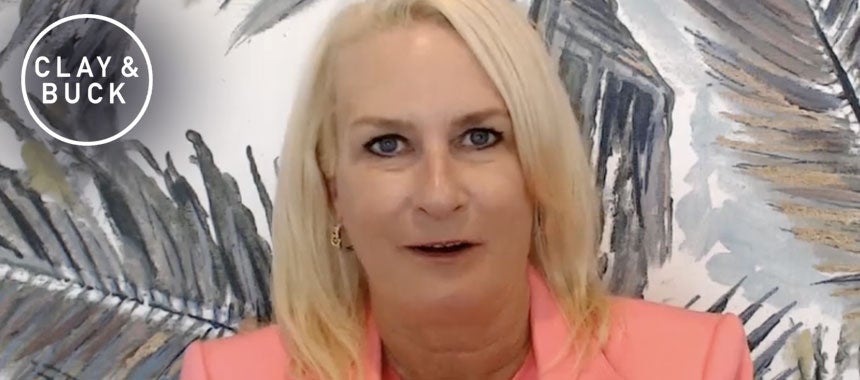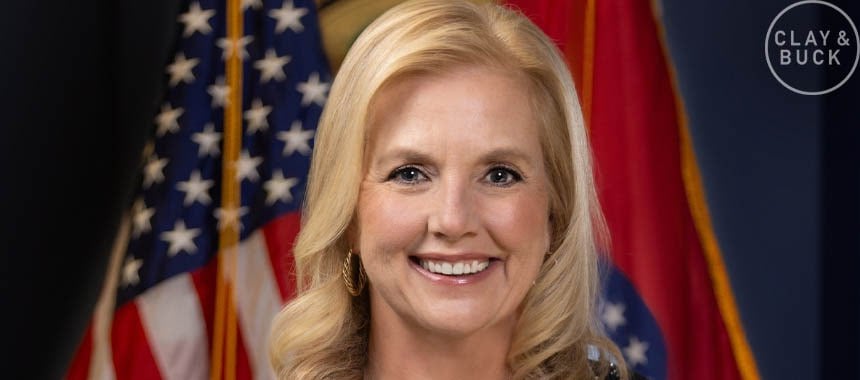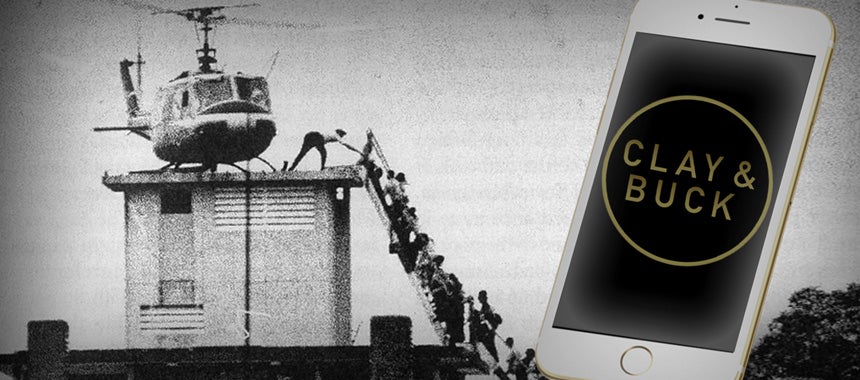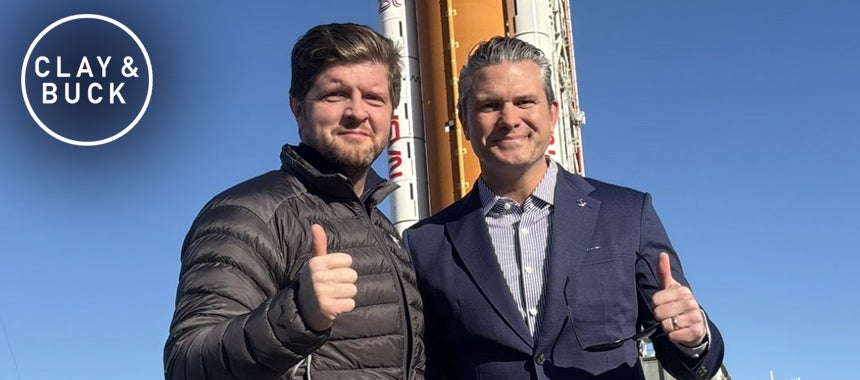Saigon Marine and Afghanistan Vets: We’ve Learned Nothing
17 Aug 2021
BUCK: John in Stamford, Connecticut, was — it says here — part of the Saigon evacuation. John, welcome.
CALLER: Hi, guys. Buck and Clay, great job. Pray for you both all the time. God bless you.
CLAY: Appreciate that.
CALLER: Yes. I was in the Marine Corps, and we were involved in evacuation of Saigon, and so many parallels are going on here. It’s like we’ve learned nothing. The big takeaway I take away from this, and I’m a little emotional, but, please…You know, every soldier fights so his sons won’t have to fight. The same mistakes are being made.
We went in there for purposely for evacuation. It turned into crowd control, right? Riot control, really, just like you’re seeing now. The chopper on top of the embassy in Saigon was the picture of that evacuation. This evacuation, I believe, will be that C-17 on the runway with all the nationals around it, just total madness and chaos. Now, they could have learned from that mistake and kept Marines and soldiers in country until the embassy was clear, if that was their goal. They did nothing!
CLAY: Does it just bring you back? You kind of talked about it, but 1975. Does it feel like you’re almost snapping your fingers? ‘Cause Biden and the administration have said we’re not going to have a Saigon-like situation.
CALLER: Yeah.
CLAY: As someone who was in Saigon, when you watch what’s going on in Afghanistan right now, it feels like basically the same thing to you all over again.
 CALLER: It break my heart, I’m in tears, and I know what it’s like to have a generation of soldiers fight and die for nothing. And we’re seeing it again. This does not have to be. We have the finest our country has to offer, and this is going on, and it’s because of poor leadership — and, believe me, it goes deeper than that, and you guys know it. But, yes, I’m there. I can’t even watch the news. It’s just that real to me.
CALLER: It break my heart, I’m in tears, and I know what it’s like to have a generation of soldiers fight and die for nothing. And we’re seeing it again. This does not have to be. We have the finest our country has to offer, and this is going on, and it’s because of poor leadership — and, believe me, it goes deeper than that, and you guys know it. But, yes, I’m there. I can’t even watch the news. It’s just that real to me.
BUCK: Well, John, thank you for your service, first of all. Thank you for your perspective and calling in. A lot of people are feeling the way you are. Thank you again, John.
BREAK TRANSCRIPT
BUCK: On the lines, we have Chris in Minnesota, a Marine Corps veteran. Chris, thank you so much.
CALLER: Yeah. Thank you, gentlemen, for taking my call. You talked about checkpoints. I have an awful story out of Fallujah in 2004-2005 about a checkpoint but I won’t go into that. I was in Afghanistan in 2006 the 1st Battalion, 3rd Marines, and we flew into Jalalabad and then from there a handful of us went to Asadabad which was further up towards the Korengal Valley.
And then even a smaller handful of us ended in Camp Blessing. The geography of Camp Blessing is much like you’re in the bottom of a soup bowl. Logistically speaking, it is an awful place to be, and we held that spot for six months. I was talking with some Marines via text message, and just the idea of all of that being in the hands of the Taliban right now is beyond heartbreaking and so I just can’t… My heart just goes out to all the other veterans that had to go through this that are just watching all of this unfold on TV and I cannot tell you how much of a debacle it is just to watch it all.
BUCK: I know. It’s a gut punch for those who served, Chris. I’m hearing it from people all over the country like you who did. I’m just wondering, what are your feelings about the…? Put aside for a second a lot of Afghans who are not vetted who are gonna say that they work with U.S. military. But for the interpreters, for those that were embedded with working with U.S. military, what’s your feeling on what should happen there?
CALLER: Yeah. Well, this is kind of a little-known phenomenon, but we developed some pretty phenomenal relationships with these interpreters, and some of them — some of the guys — got back stateside in the Marines and they worked tirelessly to try to get these guys visas to come to the United States.
BUCK: Yeah.
CALLER: Some of these guys were really great dudes who just wanted safety for their family, and they just wanted to work and keep their heads down. We had Marines that were working and some of them succeeded to get them to the United States. I talked about this with my father. Joe Biden could have done all of this in winter.
Logistically, that would have slowed down the Taliban like you would not have believed. It was just a wrong season to even go about this. So to say that there was nothing that could have been done? There was a lot that could have been done. And shame on them, quite honestly. Shame on them for not taking more preparations. You get people out before you announce that you’re pulling out. It’s the oldest trick in the book.
BUCK: Chris, thanks so much for your service and for calling in from Minnesota. We appreciate it.
 CLAY: Let’s go to Al in Colorado. Al, what you got for us?
CLAY: Let’s go to Al in Colorado. Al, what you got for us?
CALLER: Yeah, hey, Buck, great show. I was in Afghanistan as a defense contractor for six years and did aerial surveillance. When I first arrived at Asadabad, just like your previous caller mentioned, it’s a very nasty place, and we were told my point is that 20% of the Afghan army and even greater was Taliban — embedded — and the green-on-blue attacks kind of confirmed that. And I think the same thing goes for a lot, not all, but a lot of those interpreters. And now we’re gonna let in 80,000 into this country? Big mistake.
BUCK: So you’re really worried, Al, as somebody who is over there in a contractor role but on the front lines, about infiltrations even of the…? In a sense, the infiltration of the exfiltration of people alleging to be U.S. allies? You’re worried about that, that possible vulnerability for the U.S.?
CALLER: I sure am. It’s apparent. I live in a town where I see Afghans every day, and I’m in the middle of America, and these are probably just students, but, you know, I mean, why would you have to give citizenship to someone whose country you’re defending? It’s total madness.
CLAY: Thanks for the call. The biggest challenge here is the double agent factor as he’s talking about. Why would you give citizenship? The flip side to that is, if someone was truly loyal to America, the Taliban will find out and they will torture and kill not only those translators and those people who worked with the Americans. As you were saying earlier, Buck, they’re asking, basically, “Were you working with the Americans?” They’ll kill them as well as their families.
BUCK: Their families, yeah.
 CLAY: That’s why you would do it.
CLAY: That’s why you would do it.
BUCK: And that ugliness… Obviously, focus of the priority of our coverage is Americans getting out safely from Afghanistan. But there is gonna be — I would say, a certainty — in the days and weeks ahead, a lot of time spent on the let’s just call what it is, the atrocities of the Taliban against civilians and against people that they want to settle scores with.
Anyone who spent time in Afghanistan — and I could tell you this from my own experience. One thing we all know about Afghanistan is when it comes to score settling, it is deeply embedded, unfortunately, in the culture and the psyche there. So they do not forgot and they do not forgive either. The Taliban will not.
Recent Stories

Don Lemon Arrested for Minneapolis Church Attack
Clay and Buck react to the Lemon indictment -- and they have the same take.

Julie Kelly Shares J6 Parallels to the Don Lemon Indictment
Nobody but Julie Kelly will tell you that "journalists" were charged for January 6th offenses.

"Hijacked Representation": Missouri AG Explains Her Census Lawsuit
Catherine Hanaway's suit to stop the counting of illegals in the census.








